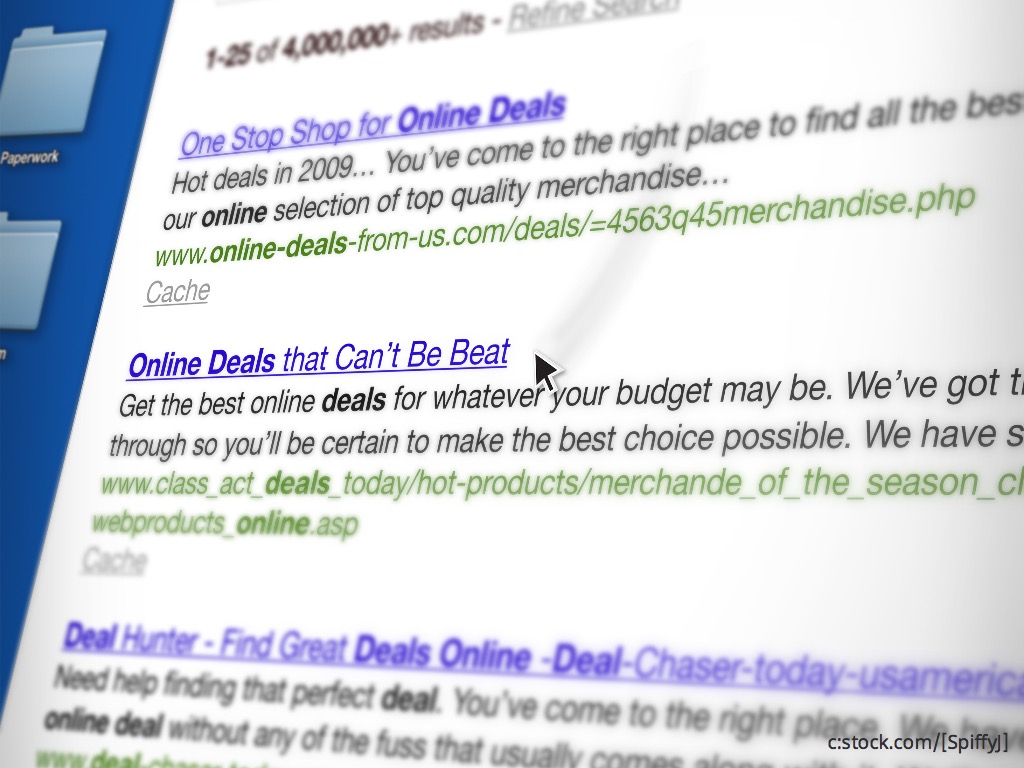
Nearly two-thirds (60%) of consumers don’t know the difference between paid and organic search results on Google, according to a new study by Varn.
The UK marketing agency approached over 1,000 internet users with the simple question; “Do you know which links on the Google search results page are paid adverts?”
A whole 59.7% of people surveyed claimed to be unaware of the differences between the two types of Google listings, implying that the majority of consumers believe top-page results to be the most relevant answers to their queries when an advertiser has bought that position.
As such, the shock findings raise questions around adequacy of disclosure by the dominant search giant, and suggests that two-thirds of its vast PPC income is generated by misdirected clicks.
But the differences between Google’s paid and organic search results haven’t always been this subtle. Five years ago, sponsored listings were highlighted and accompanied with a clear orange box with “Ad” written in it. Over the years, signposting of paid listings has become more ambiguous, with the ‘Ad’ icon and link following it appearing in green, as with the links for organic results.
In 2016, Google also removed ads from the side of search pages which, again, made them less obvious to users. With further tweaks made since then, Varn has identified a 9.4% increase in respondents who been unable to identify the difference between paid and organic listings.
“Whilst we can never be certain on the motives behind these changes, it does pose the question as to whether Google changed the colour and layout of the paid adverts to make them less easy to see to ensure they still get clicks,” commented Varn in the report.
The theory is fed further by the fact that the 33.7% who did recognise a paid search result said they would deliberately choose not to click on them. Just 6.5% claimed to knowingly click them as ads.
Google shopping ads
In a parallel piece of research focused on Google Shopping listings, PPC specialist AdPilot found that roughly one-third of internet users were unaware that results returned in the e-commerce comparison service were paid adverts.
Over 1,000 respondents were asked a similar question; “Did you know that these Google Shopping products and images that show in the Google search results are paid adverts?”. A similar pattern emerged with 30% replying that they didn’t, while the 50% knew they were ads and chose not to click on them.
What the surveys reveal – albeit based on a small pool of respondents – is an alarming lack of consumer awareness around commercial activity within Google's services. It can’t be argued that the search engine is deliberately deceiving users – paid search results are marked as such – but it should be of some concern that, in a climate stormy with debate over ad transparency – the world’s biggest and most dominant advertising company is hedging a major stake of its revenue on a misinformed click.
Last year, Google was fined €2.42 bn (£2.18 bn) by the European Commission when it was accused of skewing search results in favour of its Shopping ads. The search engine was accused of abusing its market dominance by promoting its shopping comparison service at the top of general search results.
Interested in hearing leading global brands discuss subjects like this in person?
Find out more about the Digital Marketing World Forum (#DMWF) international event series, arriving in Amsterdam from September 19-20 and New York from November 7-8.






